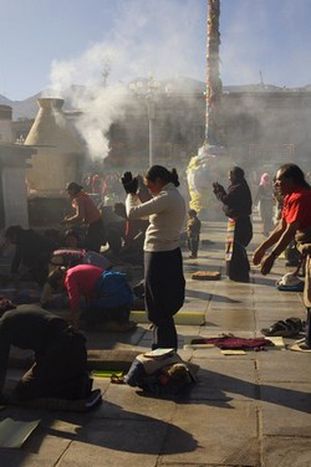
Eyewitness: Tibet out of control
Published on
Translation by:
Nabeelah ShabbirAs the tension between the Tibetan monks versus Chinese control escalates, we hear a 25-year-old Swiss tourist's version of events after a week in the capital, Lhasa
Lhasa, Tuesday 11 March
After eating in Ganglamendo, Chris, a journalist friend, and I take a walk around Bankhor Square in the centre of the Tibetan capital, Lhasa. We do a Kora (circumambulation in Buddhism) around the Jokhang Temple and trace the tension in the air. You can see groups of civil policemen and paramilitaries everywhere. Suddenly they start fighting. We are aware how dangerous it is for a tourist to get in the way of a Chinese police officer. Still, we follow the relief units and watch two civilians being arrested and led away. That night, huge demonstrations are held with not only the monks participating, but the people too.
Tibetans are an unbelievably satisfied people. Everywhere I go I make new friendships and get invited to eat or drink yak butter tea. But in many daily situations the Tibetans are horribly controlled and pressured. Friends hold out their hands, showing me the picture that they carry with them of the Dalai Lama – an action which could land them in prison. Meanwhile, the answer from the Chinese rulers in Lhasa is to provide an even bigger troop presence. Uniforms march everywhere.
Lhasa, Friday 14 March
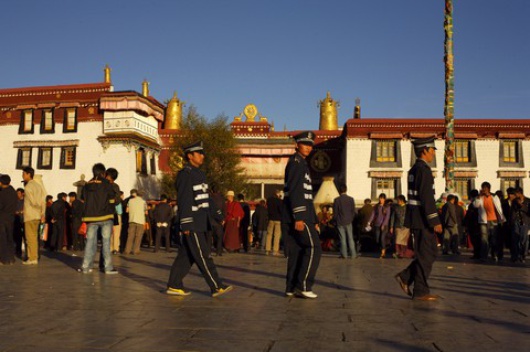 During breakfast I meet two young Tibetans. We sit under bay windows and drink chai. They are open-minded and speak good English after their escape to India. On their way back to Tibet their friend, who worked as a Chinese informer in the huge Tibetan exile community, was betrayed and arrested by the Chinese.
During breakfast I meet two young Tibetans. We sit under bay windows and drink chai. They are open-minded and speak good English after their escape to India. On their way back to Tibet their friend, who worked as a Chinese informer in the huge Tibetan exile community, was betrayed and arrested by the Chinese.
Security/ police outside the Jokhang Temple(Photo: Nice Logo/ Flickr)
Shortly before one o'clock I leave the restaurant to do another Kora. Again, lots of police and military are crawling on Bankhor Square, the heart of Lhasa.
Excitement bubbles in the little streets. Old women, children and traders tiptoe, ready to flee if needs be. I start running against the stream of tension. From afar, I hear a crowd of people howling like wolves. Suddenly I am spat out of the little alleyway I was in and find myself in the middle of Lhasa's main street, where there is a crowd of about 400 to 500. Dim, tinny thuds are the only noise breaking through the screaming and howling. Paving stones fly from a footpath across the entire street, landing in a side street, where a group of fifty armed policemen are covering behind their plastic shields. The stones have a terrible weight. You can hear the power and destruction of punctilious dim thuds. Shields break like glass as the crowd overpower their aggressors. The police can't maintain their position anymore and try to escape through the little streets. A crowd of about 100 to 200 Tibetans give chase.
Meanwhile, an old Chinese man tries to get through the crowd on his bicycle rickshaw. The crowd notice him all too soon and tear him off his bike, throwing him backwards over the barriers on the ground. As if the punches weren't enough, three men pick up stones and blindly hurl them at the old man in their anger. I can't stay any longer; I move forwards to the bicycle which has fallen on the floor.
I lift my arms and try to get myself noticed, to take advantage of the fact that I am a foreigner. I scream 'NO! NO! DON'T! STOP!' The man gets up and looks over at the crowd, disturbed. I am forced into a street and find myself looking into a brown, round face. 'You cannot be here!' 'You should go!' A man in his mid-thirties is trying to appeal to my understanding. But as a European I feel safe. Is there anyone who is more peaceful than the Tibetans? With the violence-free Dalai Lama as their example and head? And look at the lurid, murderous people they had become in these hours. The violence and cold-bloodedness required to kill another with bare hands and stones is unimaginable.
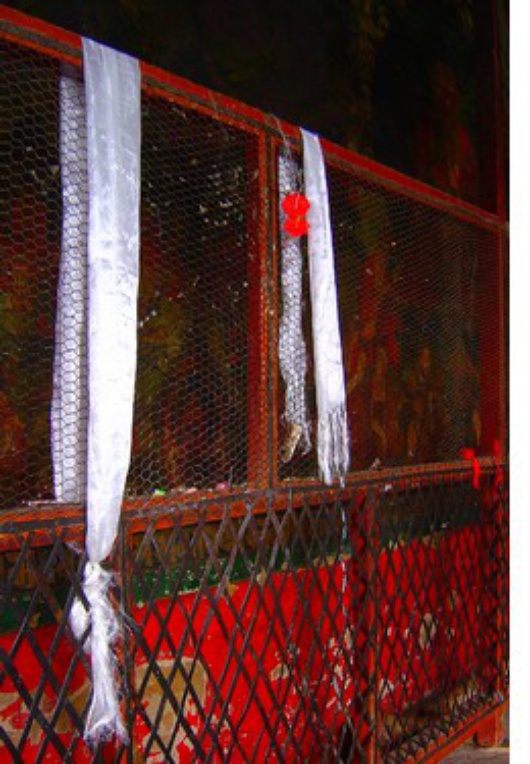 Astonishingly, I hear many Tibetans laughing. The relief of being free to move in their own city for the first time in fifty years is enormous. Tibetan shop owners set about hanging white scarves in their shops and restaurants, marking and protecting them as Tibetan.
Astonishingly, I hear many Tibetans laughing. The relief of being free to move in their own city for the first time in fifty years is enormous. Tibetan shop owners set about hanging white scarves in their shops and restaurants, marking and protecting them as Tibetan.
Lhasa, Saturday 15 March
As we awake on Saturday morning, the street is filled with at least fifteen armoured vehicles. The soldiers are young. Nothing moves on the street that isn't wearing a uniform. Throughout the day we hear shots and explosions. At around five o'clock in the evening around fourteen of us are crammed into a mini van and driven out of the city centre. The street is destroyed, dotted with twenty burnt out vehicles, seven completely razed down houses and around fifty or more destroyed and burnt shops. The soldiers have put down their bayonets but wouldn’t waste a second in aiming for you.
We are put up in a luxury hotel in the east end of the centre of Lhasa. Internet and international telephone lines are made available to us the minute we get there. The civil police hang around in the lobby, listening in.
Lhasa, Sunday 16 March
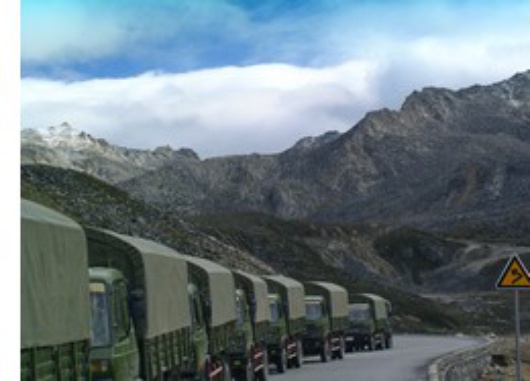 On Sunday morning we are woken by the drones of lorries and tanks. The Chinese army is storming Tibet. We count 120 lorries with 35 soldiers. More tanks. On Monday we should finally be in the city. Military checkpoints everywhere. We play the dumb tourist card and use our passports to get through. The soldiers like they are sixteen or younger. They cock their guns at the smallest movement.
On Sunday morning we are woken by the drones of lorries and tanks. The Chinese army is storming Tibet. We count 120 lorries with 35 soldiers. More tanks. On Monday we should finally be in the city. Military checkpoints everywhere. We play the dumb tourist card and use our passports to get through. The soldiers like they are sixteen or younger. They cock their guns at the smallest movement.
Kathmandu, Tuesday 17 March
On Tuesday, thanks to the help of XXX, we are flown out to a hotel in Nepal. In Kathmandu around thirty to fifty journalists are waiting for us from all over the world. They follow us into the hotel, call us in our rooms or follow us in the street. I decide to share all my experiences with them.
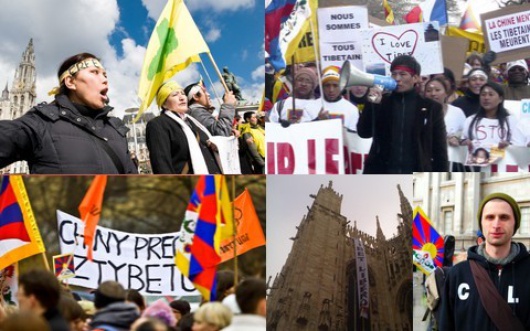 Europe supports Tibet. From above left: Tibet protests in Antwerp, Belgium and Paris, France and below: in Warsaw, Poland, a 'free Tibet' poster on Milan's Duomo cathedral, Italy and a protestor in London, England (Photos: pietel/ julien '/ gilus_pl/ reinvented/ Flickr)
Europe supports Tibet. From above left: Tibet protests in Antwerp, Belgium and Paris, France and below: in Warsaw, Poland, a 'free Tibet' poster on Milan's Duomo cathedral, Italy and a protestor in London, England (Photos: pietel/ julien '/ gilus_pl/ reinvented/ Flickr)
Got something to say about Tibet? Sign up to our e-community and speak up in our human rights forum dedicated to the
Thanks to Hannes Eberhardt
Other photos: homepage and in-box protestor in Antwerp, Belgium (pietel/ Flickr), White scarves are often laid out as offerings (citizenof1world/ Flickr), military caravans (Photo: d o d g e r/ Flickr)
Translated from Tibet außer Kontrolle




